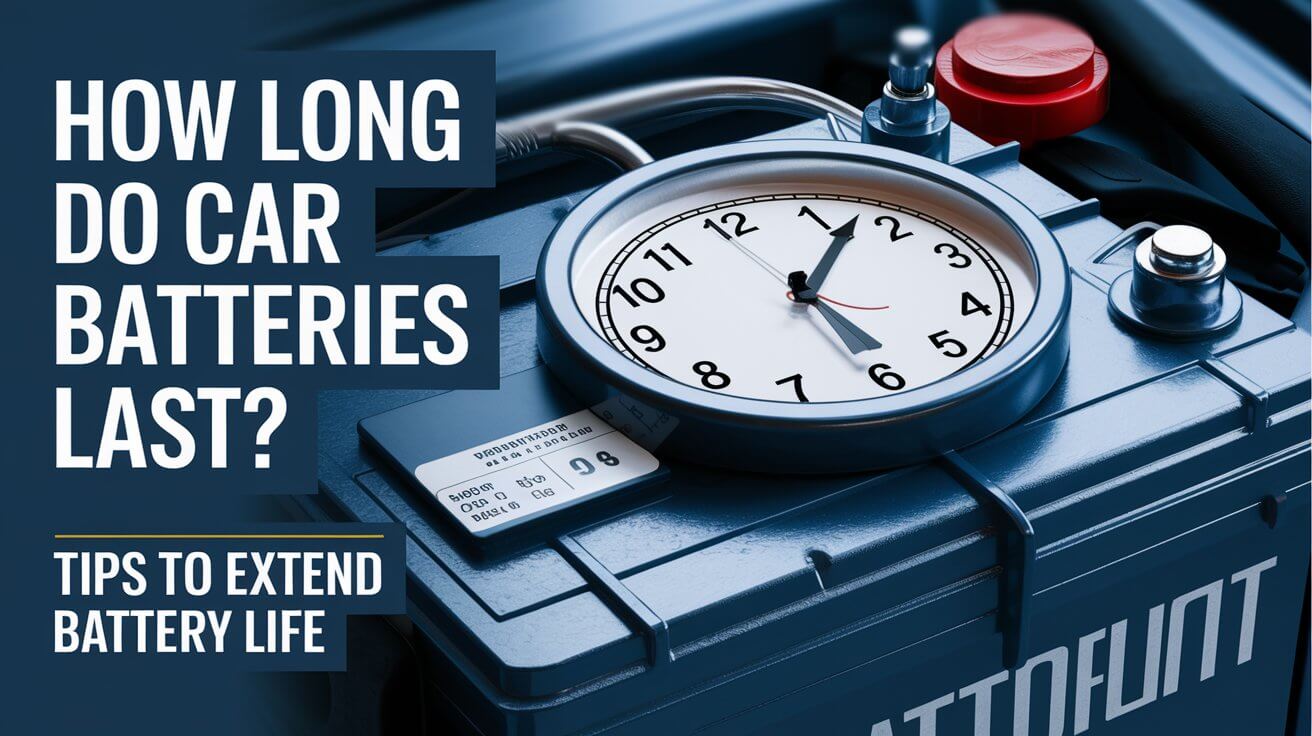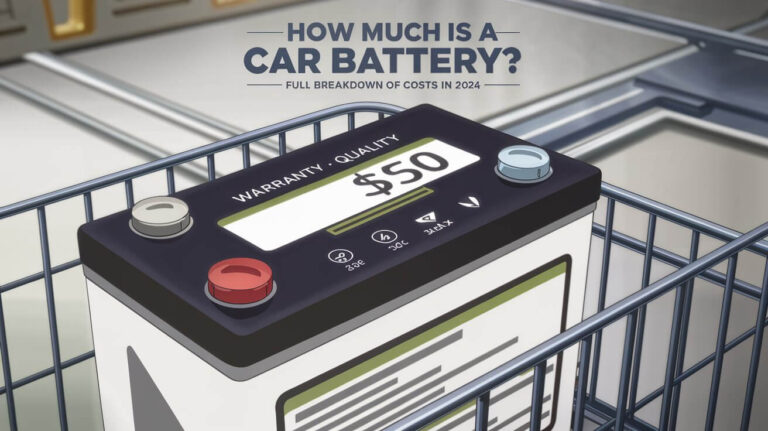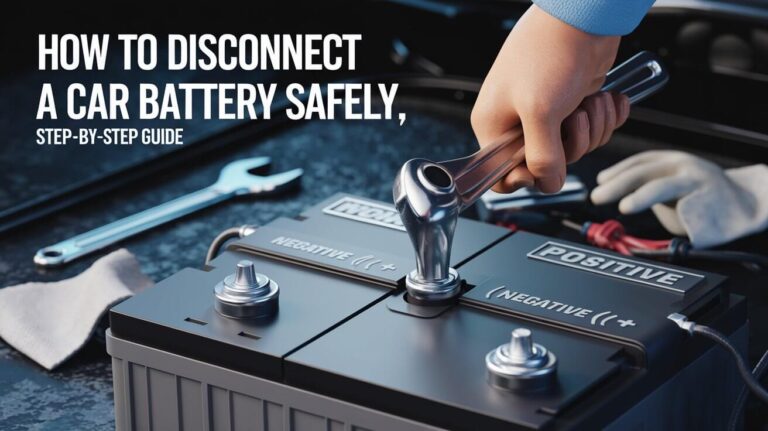How Long Do Car Batteries Last? Tips to Extend Battery Life

Car batteries are a crucial part of a vehicle, responsible for starting the engine and powering essential systems. Typically, a car battery lasts between three to five years, but various factors can impact this range. In this comprehensive guide, we’ll explore what affects car battery life, how to prolong it, and signs to watch for when it’s time to replace it. Understanding these aspects can help you avoid unexpected breakdowns and keep your vehicle running smoothly.
Types of Car Batteries and Their Lifespan
Standard Lead-Acid Batteries
The most common type of car battery is the lead-acid battery, which typically lasts between 3 to 5 years. These batteries are widely used due to their affordability and reliability. They contain lead plates immersed in an electrolyte solution, generating power through a chemical reaction.
Pros: Affordable and easily available.
Cons: Prone to damage in extreme temperatures and require more maintenance to prevent corrosion.
Absorbent Glass Mat (AGM) Batteries
AGM batteries are a type of advanced lead-acid battery that can last anywhere from 4 to 7 years. They use fiberglass mats to hold the electrolyte, making them spill-proof and capable of handling deeper discharges.
Pros: More durable and resistant to vibrations and spills. They also recharge faster.
Cons: Higher upfront cost compared to standard lead-acid batteries.
Lithium-Ion Batteries
Often found in hybrid and electric vehicles, lithium-ion batteries can last over 10 years, depending on the model and usage. These batteries have a higher energy density, making them ideal for electric powertrains.
Pros: Long lifespan and lightweight.
Cons: Expensive to replace and sensitive to temperature extremes.
Key Factors Influencing Car Battery Lifespan
Climate and Weather Conditions
Climate is one of the most significant factors affecting battery life:
- Heat accelerates the evaporation of fluids inside the battery, reducing its lifespan. High temperatures can also cause internal components to degrade.
- Cold weather slows down the chemical reactions in a battery, leading to reduced efficiency. A cold battery has to work harder to generate power, which can strain its components over time.
Driving Habits
Your daily driving routine can directly impact battery health:
- Frequent Short Trips: If you mostly drive short distances, the battery may not get fully recharged, leading to faster wear.
- Long Highway Drives: These are beneficial for recharging the battery fully, which can help prolong its life.
- Stop-and-Go Traffic: Constant starting and stopping can place more strain on the battery, leading to a shorter lifespan.
Maintenance and Care
Regular maintenance plays a crucial role in extending battery life:
- Cleaning Terminals: Ensure that the battery terminals are clean and free from corrosion. A dirty connection can reduce efficiency and lead to voltage drops.
- Checking Fluid Levels: For non-maintenance-free batteries, check and maintain appropriate fluid levels to avoid battery damage.
Vehicle Usage and Idle Time
- Leaving a car idle for extended periods can cause the battery to drain. This is because many modern vehicles have electronics that consume power even when the car is off.
- Use a battery maintainer or trickle charger if you don’t drive your car frequently. This keeps the battery from discharging during periods of non-use.
Signs Your Car Battery is Failing
Slow Engine Crank
A battery nearing the end of its life often struggles to provide enough power to start the engine. A slow crank is a common warning sign that your battery may need to be replaced soon.
Dimming Headlights and Electrical Issues
If you notice your headlights are dimmer than usual or experience electrical glitches (e.g., power windows or radio acting erratically), it could indicate a weakened battery.
Dashboard Warning Lights
Many modern vehicles have sensors that detect battery health. If a battery warning light appears on your dashboard, it’s a clear indication that you should have the battery checked.
Unusual Odors or Swollen Battery Case
A rotten egg smell can indicate a battery leak or other internal problems. A swollen battery case suggests overheating or internal damage, signaling that it’s time for a replacement.
How to Test and Diagnose Your Car Battery’s Condition
Basic At-Home Tests
A simple and quick way to check your battery’s health is with a voltmeter:
- A fully charged car battery should read around 12.6 volts or higher when the engine is off.
- If the reading is below 12.4 volts, the battery may not be holding a full charge.
Professional Diagnostic Tools
For a thorough evaluation, visit an automotive shop:
- Load testing: This measures the battery’s ability to maintain a voltage level under a heavy load.
- Conductance testing: A more advanced method that checks the internal resistance and general health of the battery.
Tips to Extend the Life of Your Car Battery
Regular Inspections and Cleaning
- Inspect your battery terminals every few months for corrosion. If you notice a white or bluish buildup, clean it with a mixture of baking soda and water. This ensures a better connection.
Avoiding Extreme Temperatures
- In hot climates, park your car in the shade or garage to protect the battery from high temperatures.
- In colder climates, keep your vehicle in a garage whenever possible. A car battery blanket or heater can also help maintain the battery’s efficiency.
Keeping the Battery Secure
- Ensure that the battery is firmly in place to reduce vibrations. Excessive movement can damage the battery’s internal components, leading to premature failure.
Driving for Longer Periods
- Take your car for a longer drive at least once a week, ideally on a highway, to ensure the alternator fully charges the battery.
Using Battery Maintainers or Trickle Chargers
- These devices provide a small, consistent charge to the battery, preventing it from going flat during long periods of inactivity. It’s especially useful if you store your car for extended periods.
How Different Conditions Impact Battery Lifespan
Effect of High Temperatures
Hot weather causes the electrolyte inside the battery to evaporate, which can lead to internal damage and a shorter lifespan. Batteries in hot climates may only last 2-3 years, even with proper maintenance.
Effect of Cold Temperatures
Cold weather reduces a battery’s ability to produce power, requiring more effort to start the engine. In colder climates, choosing a battery with a high Cold Cranking Amps (CCA) rating is essential.
Frequent Short Trips
Short drives prevent the alternator from fully recharging the battery, causing it to wear out more quickly. Plan occasional longer drives to keep the battery healthy.
Using Electronics While the Engine is Off
Charging devices, playing music, or using in-car electronics while the engine is off can drain the battery. This is known as a parasitic draw, and it can lead to a dead battery if done frequently.
Replacement Guide for Car Batteries
How to Choose the Right Battery
When it’s time to replace your car battery, consider the following factors:
- Battery Group Number: Ensure the new battery matches the size and specifications required by your vehicle.
- Cold Cranking Amps (CCA): Choose a battery with a CCA rating suitable for your climate.
- Reserve Capacity (RC): Higher RC indicates better power for extended periods.
DIY vs. Professional Installation
- DIY Installation: It’s possible to replace the battery yourself if you follow safety precautions and know the correct procedure.
- Professional Installation: A mechanic can handle complex installations, ensuring all connections are secure and that the battery is correctly fitted.
How Much Does a New Car Battery Cost?
- A standard lead-acid battery typically costs between $50 and $150.
- AGM batteries can range from $150 to $250.
- Lithium-ion batteries for electric and hybrid vehicles are more expensive, costing several thousand dollars.
Disposal and Recycling of Old Batteries
Old batteries must be disposed of properly. Most automotive shops and recycling centers accept used batteries for safe disposal, ensuring harmful chemicals don’t harm the environment.
Frequently Asked Questions About Car Batteries
Can a Car Battery Last 10 Years?
In some cases, high-quality batteries, particularly lithium-ion or AGM, can last up to 10 years. However, this is rare for standard lead-acid batteries, which usually peak at 5 years.
What are the Best Car Battery Brands?
Well-regarded brands include Optima, DieHard, Odyssey, and Bosch, known for durability and performance.
How Can You Tell If a Battery is Bad?
Check for slow engine cranks, dimming lights, and unusual dashboard lights. A professional battery test can provide a definitive diagnosis.
Can You Revive a Dead Battery?
Jump-starting can temporarily revive a dead battery, but it won’t solve long-term issues if the battery is degraded. If a battery is consistently failing to hold a charge, it’s time for a replacement.
Does Idling Recharge a Car Battery?
Idling provides a minimal charge to the battery. A 30-minute drive at highway speeds is far more effective in recharging.
Conclusion
Car batteries play a pivotal role in vehicle reliability and performance. While the average car battery lasts between 3 to 5 years, proper maintenance can extend its life. Regularly inspect your battery, drive longer distances occasionally, and pay attention to any warning signs of wear. Investing in a high-quality battery can save you from unexpected breakdowns and enhance your driving experience.
Taking proactive steps to care for your battery ensures a smoother and safer ride, no matter the conditions.


